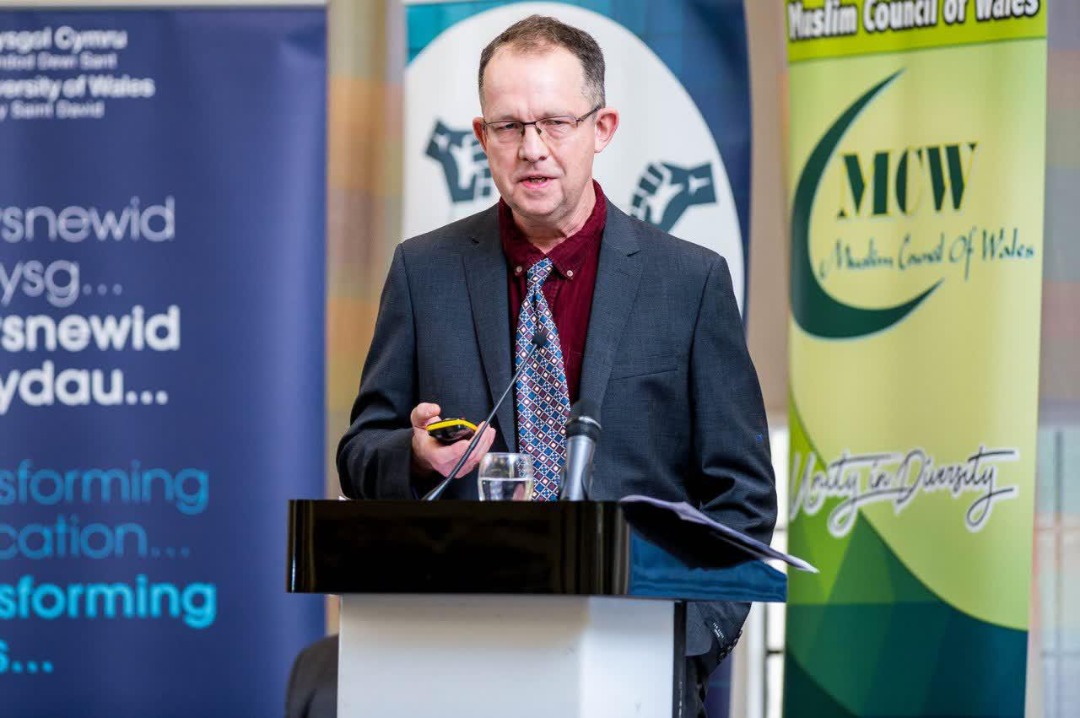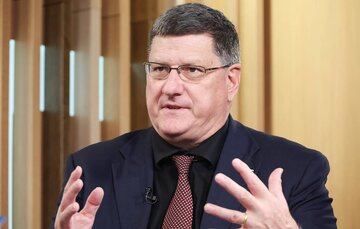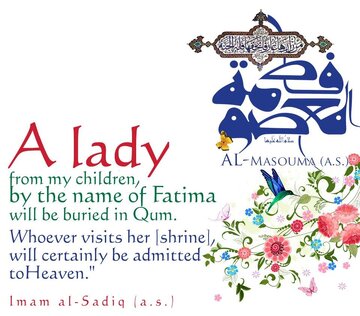Interview with Dr. Gary R. Bunt About Cyberspace and Cyber Islamic Environments
Some researchers have tagged the 21st century the century of "cyberspace". Cyberspace has become an integral part of people's daily life. People spend a large portion of their time using the internet for entertainments, businesses, social relationships and political activities. Thus, Mahmoud Rafian a researcher at Office of Islamic Studies on Cyberspace recently had an exclusive interview with Dr. GaryBunt. What follows is the interview.
The Office of the Islamic Studies on Cyberspace was established in Qom in 2018 with the aim of strengthening the development of Islamic research on cyberspace. In 2020, a summary and report of your two works entitled “Islam in the Digital Age” and “Hashtag Islam” have been prepared in Persian by the office and will be published soon. Considering the fact that you have written several articles and books about cyber-Islamic environments, we would like to have a conversation and know your opinion about some issues in this regard.
I appreciate your taking the time for this interview.
First, please tell us a brief personal and academic biography of yourself?
I am Professor of Islamic Studies at the University of Wales Trinity Saint David, on the Lampeter campus (in the rural heart of Wales). I’m originally from London and had a background in broadcast media and computers prior to commencing my studies. These elements influenced my subsequent work on Islam and cyberspace. I studied at the universities of Kent, Durham and Wales – focusing on the study of Islam, Muslim societies, history and religion. My PhD was on approaches towards ijtihad, decision-making and aspects of religious authority (in Malaysia, Pakistan and the UK). I lecture and supervise postgraduates on a range of subjects associated with Islamic Studies, with a focus on contemporary Islam and Muslims in western contexts. I have been working in this area since the 1990s and have published four books on aspects of Islam and cyberspace, along with other chapters.
One of the topics you have written several books and articles on is the issue of Islamic studies on cyberspace. Since we have made this topic a focus of the present discussion, if possible, explain this to the audience starting with a little explanation about Islamic studies on cyberspace and its necessity?
When I started work in this area, there were no browsers, but there was still substantial online activity in listservs, chatrooms and other platforms, especially on issues associated with Islam and Muslim issues. In talking to Muslim scholars during my PhD fieldwork, I saw they were increasingly using electronic communication to discuss issues associated with interpretation of contemporary concerns. I started to observe these developments, conscious that the exponential growth in internet use would have some influence on performative and authority aspects of Islam – but not realising that the impact would be so substantial. Many aspects of ritual, interpretation and beliefs can now be associated with online activities and impact at all levels of societies. This includes the influence of authorities with a specific online identity (not represented in an organisation or platform offline), as well as the impact of authorities which have extended their influence nationally and globally, amplifying specific world views and enhancing networking. As with any question people will now put their religious questions into a search engine – and may find a choice of answers that link specifically to their circumstances. Access permitting, these can circumnavigate traditional and local routes of authority and allow access to alternative perspectives. It allows micro-networks of religious interests to communicate effectively, including sub-branches of specific religious perspectives and special interest groups.
What interest you about this topic?
It is a continually shifting landscape, reflecting so many aspects of contemporary Islam over time, and responses to specific issues affecting people at grassroots levels (rather than just being an abstract academic subject). I have been monitoring online developments on a daily basis, as there are always changes and issues, which I analyse in publications and my virtuallyislamic.com website, blog and related social media. It has also been essential during my studies to observe how Islam and Muslims have been represented (and represented themselves) online, with specific narratives being applied to counter different forms of anti-religious prejudice. I try to track all developments online in relation to cyber Islamic environments, which can mean spending substantial time capturing and archiving digital content for use in further projects, especially when a major issue appears. I have worked on new methodological approaches in order to do this, as technology and approaches have changed substantially since I first started this work.
The subject was academically less accepted and recognised when I published Virtually Islamic in 2000, so it has been interesting to see its development in terms of other researchers’ and writers’ work over the past two decades. It has been important for me to explore multiple perspectives of Islam and Muslim societies, rather than just focusing on one specific form of interpretation and understanding, and this in itself has been really interesting as I have learnt so much more about diversity within Islamic understandings. It has been particularly relevant to look at the development of Muslim communities in the UK, especially with their increasing interactions with digital platforms.
I have also looked at forms of ‘radicalisation’ as manifested online, when specific interpretative frameworks have driven mobilisation and promotion of ‘militaristic jihad’. This is a small but significant element in much wider online discourse associated with Islam and Muslims, in which the internet in its different forms can drive interpretations and opinions of diverse worldviews.
It has been fascinating to see how diverse aspects of technology have been developed, utilised and applied by various interests in the name of religion(s). This has been seen most recently in the ways in which internet media have been applied by Muslim platforms and individuals as responses to the COVID-19 pandemic, where the mediation of religious practice through the internet has been essential, for example during the hajj, Ramadan and other events in the religious calendars across diverse interpretations of Islam. I am hosting an international online conference looking at these and related issues on 1st July 2021 on 'Islamic Responses to COVID-19: Authority and Religiosity in #Muslim Communities & Digital Worlds.'
What is the relationship between religion and cyberspace?
This is a contextual issue. It’s difficult to make generalisations. I have conducted some wider studies on religion and cyberspace, exploring different approaches to common issues. I think it depends on which aspect of religion one is looking at? Some platforms and organisations have been at the cutting edge of integrating their more conventional ‘analogue’ worldviews with digital output, while there was resistance from other perspectives as to the utilisation of online output. The internet was seen by some authorities as having potential to ‘corrupt’ societies, but this only allowed for gaps in the authority ‘marketplace’ to be filled by others, including religious perspectives which only had an online presence.
Many organisations and perspectives that were previously reluctant to go online are now proactive, and in some cases still catching up with the innovative players. This can be reflected in the emergence of digitally literate generations, and scholars and leaders who are more aware of the importance of cyber interactions – even if they are not the ones inputting the data themselves!
We are seeing religious perspectives and individuals, including those from under-represented zones, being proactive in putting themselves online (with scholars and authorities – however these terms are defined – creating their own social media output). The Islamic information marketplace has become quite crowded and contested, with different strategies being applied to acquire audiences.
Do you think religion can rule in cyberspace and play an effective role?
It depends what you mean by ‘rule’; I think religious output online has an increasingly dominant role, but it cannot be assumed that audiences are only looking at religiously oriented output. All the other types of materials are available online, even when attempts at controls are put into place. I would say that the role of cyberspace means that online and offline religious activities are increasingly fluid and interlinked. As I say in my books, Islam is ‘always on’, in a digital and spiritual sense. And there might not be any separation between online and offline activities. We are seeing the use of electronic devices in mosques, for example to help in prayer, recitation or accessing specific texts in classes. And mosques have increasingly streamed their activities to audiences – especially during the pandemic – who have conducted their ritualistic practices at home. In some contexts, families during Ramadan filmed and photographed their devotional activities, sending them back to their mosques to form congregational montages of ritualistic practices.
How do you assess the future sovereignty of cyberspace?
The internet was not designed as an entity that could be easily controlled. Attempts at censorship, restriction and control can be circumnavigated by technologically literature individuals and ‘digital natives.’ At another level, hacking, cracking and digital disruption have evolved in sophistication. The development of regional or national intranets may seek to direct audiences, but popular global tools such as Facebook and Twitter have yet to be replaced by domestic and controllable equivalents. The idea of control is limited. However, mediation of specific zones by ‘gatekeepers’ and guides who curate specific nuanced content for particular audiences will become increasingly significant, at a time of increasing information overload.
In the book Hashtag Islam, you talked about the Cyber Caliphate. Do you think it is possible to form and establish an Islamic government in cyberspace?
Aspects of Islamic religious authority, guidance, information and education will have a place in cyberspace. Governments of Muslim majority contexts and states have developed effective computer mediated agencies for their activities, while departments have invested substantial resources in multifaceted and nuanced online resources. Specific agencies present databanks of ‘fatwas’, opinions and guidance from governmental authorities. It does not take long for a new opinion or advice to acquire a national or international audience. I don’t think that all aspects of government could necessarily be formed in cyberspace – this is presuming, perhaps, something that goes beyond traditional concepts of borders.
We have, of course, seen attempts at this in recent history with various and fluid – not necessarily universally accepted – definitions of the term ‘caliphate’ have been applied. At other governmental levels, depending on the context, cyberspace can present an opportunity for presenting multimedia sermons, religious messages, education, debates, ‘infotainment’, and online ritualistic practices developed for diverse and nuanced audience groups. These elements can also have a logistical and commercial edge, as sources for fundraising as well as charitable activities. In Iran, for example, it is recognised that shrines, pilgrimage places and religious platforms can effectively present many aspects of their religious activities in a digital format, subject to investment of time and resources.
As someone who has an external view on Islam and Muslims in cyberspace, which Islamic group do you think has been better and more effective in this space?
I have explored this question in Hashtag Islam and other books, but it would be onerous to suggest one group has been more effective; there have been ‘trailblazers’ over time, some of whom have now disappeared from the internet. I think that some of the online ‘fatwa’ provision across the Islamic spectrum has been effective in building audiences for specific worldviews, drawing on diverse interfaces, while also developing notions of affiliation and membership for users who are ‘shopping around’ for opinions. The tech-literate individuals who have been able to utilise new platforms quickly and skilfully have often been more effective than groups and organisations with online bureaucracies and contested views about the internet’s use in contemporary contexts.
Some of the most effective use has been from specific developers (rather than organisations), who have created apps on different aspects of Islam. These include Qur’an apps, which offer diverse translations and recitation styles; I use these in my own lectures, and the students find them really interesting and moving. Simple prayer apps linked to GPS offer a direct service to users, with newcomers now providing full guarantees of data-privacy, which is an effective strategy for gaining a hold in the digital marketplace. Hajj apps have also been effective in offering real time streaming linked to GPS to help pilgrims at the different stages of pilgrimage have also been impressive.
Some of the ‘radicalising’ voices online have also been more effective and proactive over time in utilising online media to promote their message, with their recognition that the medium was effective, difficult to censor and could develop networks of affiliation and support.
Perhaps the most ‘effective’, however, have been the marginalised and oppressed voices within Muslim societies, who have been able to acquire a global audience of support on social media platforms for their activism with various religious, cultural, human rights and other concerns.
....................................................
End/ 257





